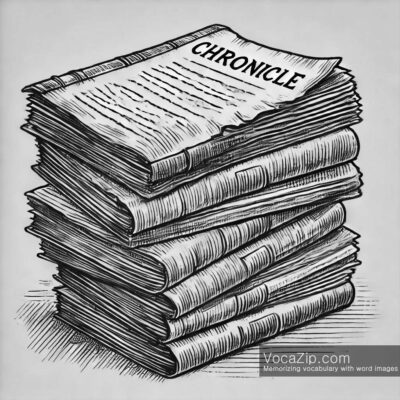chronicle meaning
chronicle :
record, history
noun
▪ The chronicle tells the story of the king.
▪ The record tells the story of the king.
▪ She read a chronicle of ancient Rome.
▪ She read a history of ancient Rome.
paraphrasing
▪ account – record
▪ diary – personal record

chronicle :
to record, to document
verb
▪ They chronicle the events of the war.
▪ They record the events of the war.
▪ The book chronicles her life story.
▪ The book documents her life story.
paraphrasing
▪ narrate – to tell
▪ recount – to tell in detail
Pronunciation
chronicle [ˈkrɒn.ɪ.kəl]
The stress is on 'chron' and sounds like 'kron-i-kul'.
Common phrases and grammar about chronicle
chronicle - Common meaning
noun
record, history
verb
to record, to document
Part of Speech Changes for "chronicle"
▪ chronicler (noun) – person who records events
▪ chronic (adjective) – long-lasting
Common Expressions with "chronicle"
▪ historical chronicle – record of past events
▪ chronicle events – record events
▪ chronicle in detail – record with details
▪ chronicle of a journey – record of a trip
Important examples of chronicle in TOEIC
Vocabulary examples from the TOEIC test
In TOEIC vocabulary questions, chronicle is used to mean a detailed account of events.
Example of a confusing word: chronological (arranged in order of time)
Grammar examples from the TOEIC test
Chronicle is often used as a verb to mean documenting events in TOEIC grammar questions.
chronicle
Idioms and fixed expressions in TOEIC
chronicle of events
'record of events', used when describing a sequence of happenings.
chronicle one's journey
means 'to record one's trip', used when describing travels.
Differences between similar words and chronicle
chronicle
,
record
differences
Chronicle is often used for historical or detailed accounts, while record can be any kind of documentation.
chronicle
,
diary
differences
Chronicle is a formal record of events, while diary is a personal record of daily life.
Words with the same origin as chronicle
The origin of chronicle
chronicle comes from the Greek 'khronika,' meaning 'annals' or 'history,' and was used for recording events.
Word structure
It has the root chron (time) and suffix icle (noun), meaning 'record of time'.
Words with the same origin
The root of chronicle is chron (time). Words with the same root include chronological (arranged in time order), synchronize (to happen at the same time).
Please select an image in the quiz
Previous post and next post


disposable
604
meant to be used once
adjective ┃
noun ┃
Views 4


fundraising
606
related to collecting money
adjective ┃
noun ┃
Views 6





